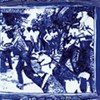Published June 26, 2013 at 11:36 a.m. | Updated October 19, 2020 at 4:05 p.m.
The dust jacket of Sue Halpern’s new book sends mixed messages right off the bat. The title sounds like the setup for a joke: A Dog Walks Into a Nursing Home. But the subtitle isn’t funny at all. Lessons in the Good Life From an Unlikely Teacher suggests an earnest tutorial on right living. The photo of the winsome labradoodle, warm brown eyes staring straight into the camera, signals that this is the titular dog and presumably the teacher. In other words, expect heartwarming tales of a precocious canine who delivers unconditional love and puts judgmental humans to shame. And what is her tiny white cap, emblazoned with a red cross, meant to convey? The dog is … a nurse?
All those assumptions are sort of true, and sort of not. Pransky the labradoodle is a therapy dog, as Halpern tells us immediately in the introduction to her book. The ensuing 300 pages chronicle the experiences the Vermont author and her intuitive pooch have over three years of Tuesday-morning visits to a local nursing home Halpern refers to as “County.” As anyone who has ever known a dog will expect, the pages are indeed filled with anecdotes about various nursing-home residents and how each reacts to — and, in some cases, is transformed by — the presence of a charming, patient, eager-to-be-petted pup.
But, as anyone who has ever read Sue Halpern will expect, A Dog Walks Into a Nursing Home is not a book of the Chicken Soup for the Soul ilk. The author of four previous titles — one of them about dementia and memory research — and numerous magazine articles, Ripton resident Halpern has been a Rhodes scholar and a Guggenheim fellow and is currently a scholar-in-residence at Middlebury College. She is married to author and environmental activist Bill McKibben. Halpern is not just a dog lover and a volunteer at a nursing home, but an intellectual, thoughtful and deeply perceptive one.
She thinks, as naturally as breathing, about the causes of behavior, the underpinnings of morality and the meaning of existence. And Halpern is a gifted writer who effortlessly weaves philosophy, theology, psychology and neuroscience into gently humorous, vividly descriptive storytelling. One moment you’re reading about a cute dog; the next, you’re contemplating the teachings of ancient Greeks. Consequently, A Dog Walks Into a Nursing Home is an unexpectedly profound and informative read, even as it entertains and, yes, warms the heart.
Halpern is also a self-described introvert whose social reticence, she quickly realizes, is overruled — in fact, irrelevant — when Pransky does her “therapy” thing.
I understood something about practical wisdom and moral behavior that I hadn’t before Pransky and I stepped into the nursing home: though I was in control of the leash, my dog was going to be my guide here. This was not because she was, as we like to imagine dogs, “nonjudgmental.” I had to assume she was making judgments about people and situations all the time. But watching Pransky was a revelation. “Prudence is prescriptive,” Aristotle wrote, “for its goal is determining what one must do or not do.” What Pransky could do, and I could not, yet, was meet people exactly where they were (disabled, jolly, mute, demented, frail, lonely, tired, chatty), without a moment’s hesitation, and that was a gift.
Halpern does not make clear exactly why she chose to turn Pransky into a therapy dog, other than suggesting her pet seemed bored and needed a job. As the author spells out, the rules and tests for service animals are strict, and training her free-range “country” dog to walk with a leash and obey new, restrictive commands is not easy. With immense patience — and a little “cheating” — on Halpern’s part, Pransky eventually earns her license.
At the nursing home, the tables are turned, in a manner of speaking. Halpern finds her presumptions, and her introspective personality, challenged. But affection comes naturally to her dog: Pransky intuits which residents want her to climb onto their bed; which ones will simply stroke her head; even, seemingly, which ones need creature comfort as they exit this world.
Halpern observes and comments on these human-and-canine interactions; far from a detached bystander, she finds herself changed by them, too. “‘Fun’ is not a word I would have associated with spending time in a nursing home,” she writes. “Depressing, maybe, or unpleasant or sad, but not fun or enjoyable or entertaining.” But her time at County proves to be just that. Typically, Halpern bolsters personal experience with scientific data:
[I]n a 2010 study on the health benefits of volunteering, 73 percent of the respondents said that volunteering lowered their stress levels, 89 percent reported that it enriched their sense of purpose in life.
When she and Pransky enter a resident’s room for a visit, or are stopped in the hallway so someone can talk to the dog, Halpern feels, as she puts it, like “we were winning a lottery we hadn’t known we were playing.”
For all its warm-and-fuzzy moments, A Dog Walks Into a Nursing Home is clear-eyed about the debilitating consequences of aging — memory loss, physical infirmities, dependency, loneliness — and about death. Nor does Halpern avoid commentary on the physical, psychological and economic realities of caring for the elderly. Her descriptions sometimes suggest that she sees in County’s residents hard-won and undervalued virtues:
There are no awards for fortitude. It is rare that a medal is pinned on someone for pain and suffering, or for hanging on for the long haul despite obstacles, sadness, grief, and come-what-may. There was no award for Lizzie, for twenty years of entrapment in a twisted body, and none for the mother for standing by her. There was no award for Dottie, and none for Iris or Dan or any other resident of County or the people who cared for them…
What Halpern finds at the nursing home, too, is compassion, love and devotion in generous supply. She finds that the residents are just like middle-aged people, but a few years older. And she finds that life itself is its own reward. It’s hard to “butt up against mortality” week after week, Halpern suggests, and not think about how not to squander your own years on this earth. Accordingly, as her book’s subtitle promises, Halpern explores what makes a good life — for humans and canines.
“Pransky raises her nose to the air, breathes deeply, and charges ahead,” she concludes. “Though the ancients didn’t think so, there is wisdom in that, too.”
"A Dog Walks Into a Nursing Home: Lessons in the Good Life From an Unlikely Teacher" by Sue Halpern, Riverhead Books, 312 pages. $26.95.
Halpern discusses and signs her book on Thursday, July 18, 7 p.m., at Phoenix Books Burlington. Info, 448-3350. phoenixbooks.biz
More By This Author
Speaking of...
-

Work: The University of Vermont's Hazardous Waste Technicians
Feb 12, 2014 -
![Art From the Heart [SIV342]](https://media1.sevendaysvt.com/sevendaysvt/imager/art-from-the-heart-siv342/u/review/2297986/stuck021214.jpg)
Video: Art From the Heart
Feb 12, 2014 -

Comedian Cindy Pierce Talks About Sex, Female Anatomy and What College Students Can't Learn From Porn
Feb 5, 2014 -

Two Out of Three: Original Works by Vermont Playwrights Dominate Lost Nation Theater's Winterfest
Feb 5, 2014 -

'Mudtime' to Music: A Rising-Star Composer Collaborates With Vermont's Poet Laureate
Feb 5, 2014 - More »
Comments
Comments are closed.
From 2014-2020, Seven Days allowed readers to comment on all stories posted on our website. While we've appreciated the suggestions and insights, right now Seven Days is prioritizing our core mission — producing high-quality, responsible local journalism — over moderating online debates between readers.
To criticize, correct or praise our reporting, please send us a letter to the editor or send us a tip. We’ll check it out and report the results.
Online comments may return when we have better tech tools for managing them. Thanks for reading.












































